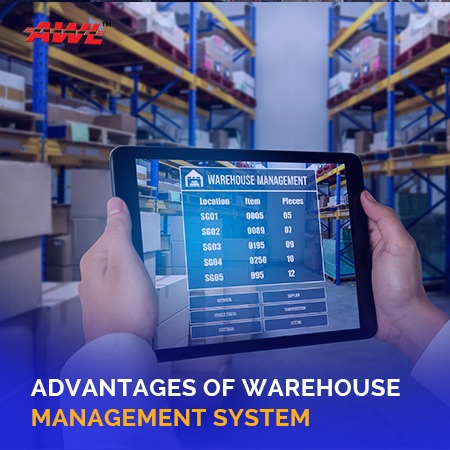

One of the primary advantages of a warehouse management system is improved inventory accuracy. By automating inventory management processes, WMS can help businesses keep track of their inventory levels and avoid overstocking or understocking of products. With accurate inventory information, companies can make better decisions regarding production, purchasing, and distribution. Another advantage of WMS is increased efficiency in warehouse operations. WMS can help optimise the layout of the warehouse, improve order picking and packing processes, and reduce the time it takes to move products in and out of the warehouse. This increased efficiency can lead to lower operating costs, higher productivity, and faster order fulfilment.
Numerous advantages come along with WMS. AWL India has curated a list of the best in class advantages that come along with a warehouse management system. Here are some of the best advantages that come along with a warehouse management system:
Warehouse Management System (WMS) is a software solution that assists businesses in managing and optimising warehouse operations. One of the most significant advantages of using a WMS is the real-time visibility it provides into inventory levels. With WMS, businesses can monitor product movement, track inventory, and optimise stock levels in real time. This real-time visibility into inventory levels ensures that companies can efficiently manage stock and avoid stockouts and overstocking. Additionally, WMS allows businesses to reduce inventory errors, crucial to maintaining high customer satisfaction. By reducing inventory errors, companies can improve order fulfilment rates and avoid the costs associated with incorrect or delayed shipments.
Warehouse management systems (WMS) are designed to increase productivity and efficiency by automating various tasks and providing real-time information on inventory levels, order processing, and shipping. By automating manual processes and reducing the time and effort required for inventory management, WMS allows employees to focus on more value-added tasks, such as improving customer service, optimising warehouse layouts, and managing inventory levels more effectively. This can result in improved productivity, reduced labour costs, and increased business profitability. Overall, WMS can help companies streamline their operations and achieve greater productivity and efficiency in their warehouse management processes.
Warehouse management systems (WMS) streamline processes by automating various tasks, such as receiving, putaway, picking, and shipping. The system's software allows for efficient workflows, which helps employees know what tasks must be performed and when. This reduces the amount of time and resources required to manage the warehouse. In addition, streamlined processes result in fewer errors, reducing the need for time-consuming and costly inventory corrections. Overall, WMS increases operational efficiency and helps warehouses run more smoothly, resulting in a more productive and profitable business.
Implementing a warehouse management system (WMS) can lead to increased efficiency in warehousing operations. WMS provides real-time data on inventory levels and location, which can help warehouse employees locate and pick items more quickly and accurately. The system can also automate various processes, such as order processing, picking, packing, and shipping, which can reduce manual errors and increase the speed of operations. By streamlining processes and automating tasks, businesses can save time and money, and increase their overall efficiency, ultimately leading to higher customer satisfaction and increased profitability.
Warehouse Management Systems (WMS) help improve customer service by providing better inventory management and order fulfilment processes. With real-time inventory data, businesses can quickly identify the location of items, reducing the time it takes to locate products for shipment. This results in faster and more accurate order fulfilment, leading to happier customers. Moreover, WMS provides businesses with the ability to track orders throughout the supply chain, from picking to shipping. This enables companies to provide accurate and timely order status updates to their customers, enhancing customer satisfaction and loyalty. Overall, WMS helps businesses provide a better customer experience.
A WMS can help businesses to comply with various regulations, such as safety and security standards, food safety regulations, and environmental regulations. With WMS, businesses can track and manage inventory in accordance with specific regulations and laws, reducing the risk of penalties or fines for non-compliance. The system can also help ensure that products are stored and transported in a manner that meets regulatory requirements, such as maintaining proper temperature controls for perishable goods. By adhering to regulations, businesses can build trust and confidence with customers, suppliers, and regulatory agencies, enhancing their reputation and competitiveness in the market.
One of the significant advantages of using a WMS is its scalability, which means it can grow and adapt to the changing needs of a business. As companies expand, the volume of products they manage also increases, making it more challenging to handle warehouse operations efficiently. A WMS offers scalable solutions to businesses, enabling them to handle growth, increase order volume, and manage an expanding customer base without compromising the efficiency and quality of their warehouse management processes. This scalability feature also allows companies to adjust their inventory management and warehouse operations quickly in response to seasonal demands and fluctuating market trends.
In conclusion, the implementation of a warehouse management system (WMS) can bring a plethora of benefits to businesses, from increased efficiency and productivity to better customer service and compliance with regulations. By streamlining processes, providing real-time visibility into inventory levels, and automating manual tasks, WMS can significantly enhance warehouse operations and supply chain management. As a leading logistics and supply chain management company in India, AWL India offers its own WMS solution, SWIM, to help businesses achieve these benefits and stay ahead of the competition. By transitioning to SWIM, companies can expect to improve accuracy in inventory management, efficiency in warehousing operations, and speedy order fulfilment for both B2B and B2C sales.

